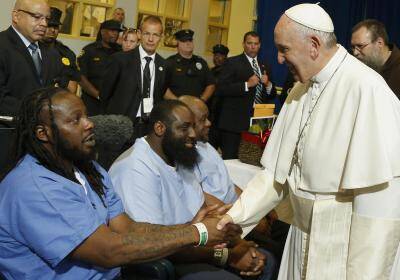‘It’s a moment of sanity.” That’s how Archbishop Thomas Wenski of Miami characterized a confluence of mid-October events promoting criminal justice reform in the United States.
On Oct. 21 a new campaign urging reduced incarceration was launched by a surprising source, the group Law Enforcement Leaders to Reduce Crime and Incarceration, a new association of more than 130 of the nation’s police chiefs and other top law enforcement officials. In Washington on Oct. 22, President Obama passionately endorsed efforts to reform the U.S. criminal justice system during an hourlong panel discussion with many of those same law enforcement officials, and on the same day a congressional subcommittee cleared the Sentencing Reform and Corrections bill for a vote in the U.S. Senate.
That measure includes a reduction in mandatory minimum prison sentences for low-level drug offenders, allows federal judges more flexibility in sentencing and calls for limits on the use of solitary confinement for juveniles in federal facilities. The act’s impact on mandatory minimums for inmates convicted in federal courts would be retroactive, so some federal inmates now serving time could see their sentences reduced.
The legislation was endorsed by Archbishop Wenski on behalf of the U.S. Conference of Catholic Bishops in a letter to Congress with Donna Markham, O.P., president and chief executive officer of Catholic Charities USA. “We welcome this modest bipartisan first step to reform our nation’s broken criminal justice system,” the two Catholic leaders wrote on Oct. 19.
The U.S. bishops have been “enthusiastically behind this,” the archbishop told America on Oct. 22, “and we are very pleased to see both Republicans and Democrats getting behind it.”
Archbishop Wenski argues that it is high time for the nation to take a more critical look at the economic and social impact of its decades of tough-on-crime policies, noting that with 2.2 million people incarcerated, there are more U.S. citizens and residents per capita currently behind bars than were jailed in the old Soviet Union.
“Prisons are being treated as de facto mental health hospitals,” he said. The archbishop called that a very expensive and inhumane way to treat mental illness. Prisons are overcrowded and rates of incarceration are breaking up families and communities, he said, adding that they have been especially hard on African-American families and neighborhoods.
The national situation “cries out for some correction,” the archbishop said.
Though the outlook for the passage of even this measured reform bill is far from sure, Archbishop Wenski said, “The best thing about this particular proposal, so far anyway, is that it’s got broad bipartisan support.”
Criminal justice reform, he suggests, could represent a breakthrough for a Congress that has given little evidence it can address the nation’s biggest challenges. “If you want to do something to break down the paralysis in Washington and in Congress,” Archbishop Wenski said, “this would be a significant issue to do it on.”
Restoring a sane approach to criminal justice, the archbishop acknowledged, will not happen unless states join the federal government in re-evaluating the fairness and reasonableness of state-level sentencing policies. “But the federal government and Congress can lead the way,” he said, especially if they begin to apply reform conditions to disbursements of federal cash to the states’ criminal justice systems. He does not think, given the rising costs of incarceration, that reform will be a hard sell at the local level.
“If we can’t persuade them with the humanitarian argument, maybe they’ll hear the practical” appeal, he said. The United States spends an estimated $80 billion a year on incarceration. That means each U.S. resident is paying about $260 per year on corrections, a figure way up from the $77 per person in 1980.








